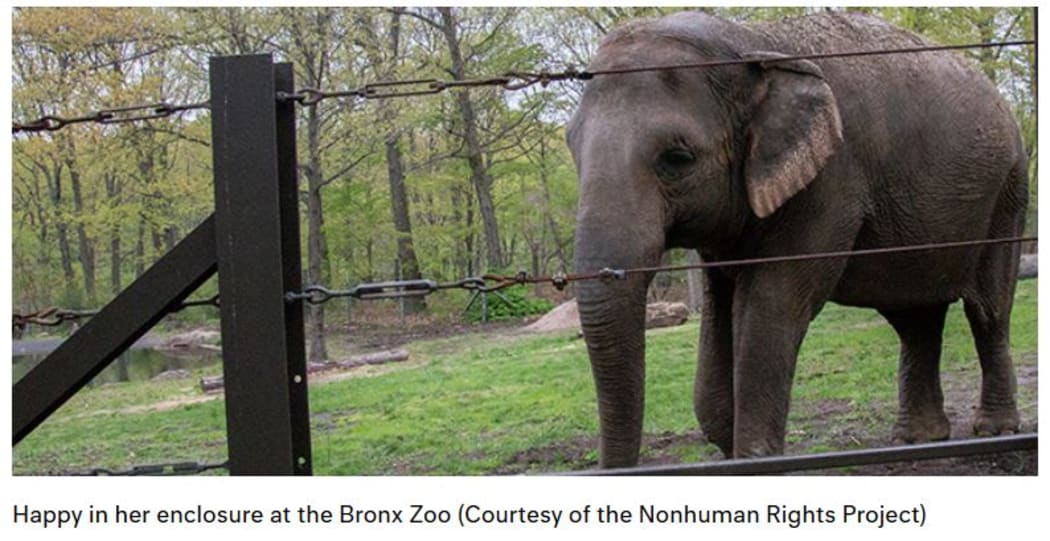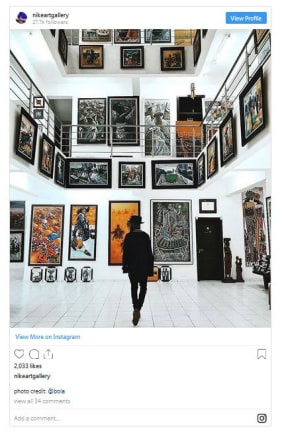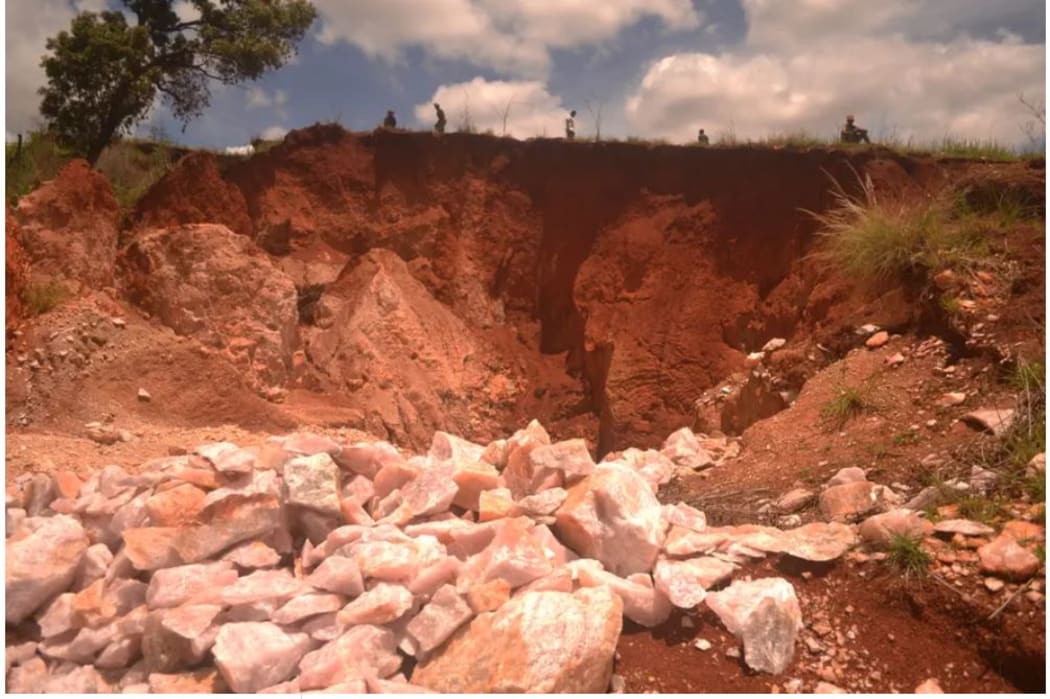A couple of week's back on Mediawatch Midweek we heard about David Byrne's new online magazine Reasons to be cheerful. Well, Jeremy Rose has continued his search for stories that put a smile on his face.
More reasons to be cheerful...
An elephant called Happy is anything but according to the activists who have taken New York's Bronx Zoo to court in an effort to establish that elephants - and some other animals - should be considered legal persons.

Photo: Dissent Magazine: screenshot
The case has been brought by the Nonhuman Rights Project. The group have been unsuccessful in earlier attempts to do the same thing for chimps.
In a backgrounder on the case Dissent Magazine wrote: " Elephants have a knack for demonstrating that they think, feel, and remember—in a way humans can easily understand. Famous for ritualized expressions of grief, they have been observed covering deceased family members with leaves and dirt, touching their bodies, and even visiting their grave sites. The elephant’s trunk, a combination nose and upper lip that contains 40,000 muscles, is capable of expressing compassion and annoyance in a human-like manner through affectionate touches and playful shoves. An elephant can even apparently communicate an aversion to captivity, by pulling at the rope around its neck or stuffing leaves into the bell on its collar to avoid being easily found for the start of a logging shift."
Extending legal personhood to non humans isn't a new idea. Corporations were first recognised as legal person by US courts as far back as the 19th Century and New Zealand has granted legal personhood to the Whanganui River and Te Urewera. The move gained international attention when the Guardian followed up an ABC programme on the topic with a nifty little Facebook video that went viral back in 2016. Strangely it had barely been reported in New Zealand.
Last July Vox.com reported Bangladesh had declared all of its 700 rivers to be legal persons. And Earth.com last week reported that the Philippines could become the next country to grant legal personhood to nature. The article points out that Argentina, India and Germany have already all recognised extra legal rights for animals.
So it's a growing worldwide movement but the jury's still out on what practical impact it has on conservation and animal welfare.

Photo: France24: screenshot
Plainly what makes us cheerful is an entirely subjective thing but news that Dunkirk has abolished fares on all its public transport did the trick for me. It's a city of only 80,000 - so unlike many of the public transport and cycling city stories the argument that it only works because of population density doesn't stack up.

Lagos Photo: Reasons to be cheerful: screenshot
David Byrne's Reason to be cheerful online magazine this week has an article on Lagos's thriving art market. Byrne makes the point that the market is sustainable - in the sense that the buyers are Nigerians not European and North American collectors. And that local artists aren't creating with buyers in New York and Paris in mind.
But he also points out that part of what makes that possible is the existence of a very wealthy minority. That got me thinking about Anthony Bourdain's fantastic episode on Haiti No Reservation. It revealed a community overflowing with creativity despite almost unimaginable hardship. And one of the most striking things about the art is that it seems to exist outside of any market. .
Laurent Dubois - the author of Haiti: The Aftershocks of History told me a few years ago that the abolitionist movement was divided between an elite that wanted to see a continuation of the plantation economy and ordinary Haitians who had developed a communal system of agriculture.

Photo: Anthony Bourdain
Reasons to be glum
Okay enough with the cheerful news stories that have failed to make a splash in our media. What about some depressing ones that have been also been ignored? Well - how about the fact that New Zealand's most senior intelligence officials felt it would be wrong to raise concerns or ask questions of the US over its use of torture.
A couple of week's back it was widely reported that an investigation by the inspector general of intelligence and security had cleared the SIS and GCSB of being complicit in the US torture of detainees - but that they had supplied questions to be asked of some of those being tortured.
Gordon Campbell wrote about the report on his Werewolf blog and said it amounted to a litany of failure on the behalf of the GCSB and the SIS.
He quotes the report as saying the agencies - unlike their foreign counterparts - did virtually nothing to prepare their staff for the "moral ambiguities" they were likely to encounter in the field.
Alarmingly the former directors of the agency told the director general "that they did not agree that they had an obligation, whether statutory or otherwise, to ask questions of their counterparts when credible allegations about acts of torture by partner agencies came to light… "
And the directors made it plain they felt as the smallest member of Five Eyes they felt it was inappropriate to raise any concerns they might have.
Campbell quotes from the report: "As one of the former Directors said, it was not realistic to think that New Zealand could have said “please explain” to the United States, the most powerful country in the world. Realistically the response would have been that New Zealand would again have been cut out of the recently resumed intelligence flow, at a time when it most needed it."

Photo: Guardian: screenshot
While we're on the topic of spies - or former spies - interesting Guardian interview with Edward Snowden in Moscow to promote his new autobiography Permanent Record.
Tess McClure - a former RNZ journalist and deputy editor of Vice NZ and now a student at the Columbia journalism school - has an extraordinary investigation into the crystal trade up on the Guardian.
The beautifully crafted story takes us from the world's biggest gem show in Tuscon, Arizona to Madagascar where McClure ventures down a mine-shaft to witness first-hand the dangerous daily reality of the children who dig out the crystals so prized by the wellness industry and its new age devotees.

Rose quartz lies in the sun at the edge of a mine near Anjoma Ramartina. Photo: Photograph: Tess McClure
One seller of the crystals at the Arizona fair suggests the rose quartz, carnelian and amethyst could actually benefit from that provenance. The circumstances of the miners “makes the pieces a lot more special. Because I know some person in a little baby hut was actually polishing it by hand, and they’re setting their intentions into it, too,” she said. “People’s intentions and people’s energy are put into the stones as they’re producing it.”
A great flood of climate stories
This week sees more than 250 news organisations around the world taking part in Covering Climate Now - a project launched by the Columbia Journalism Review and the Nation magazine.
Huge quantity of material being produced in the lead-up to next week's summit in New York. Most of New Zealand's major media outlets have signed up.
The Intercept has an interview by Naomi Klein with Greta Thurnburg in which the young Swedish activist says: "If we can save the banks then we can save the world."
Spinoff's cooking section has got into the act by "going vegan" for the week. They point out themselves the irony of the section being sponsored by freedom farms.

